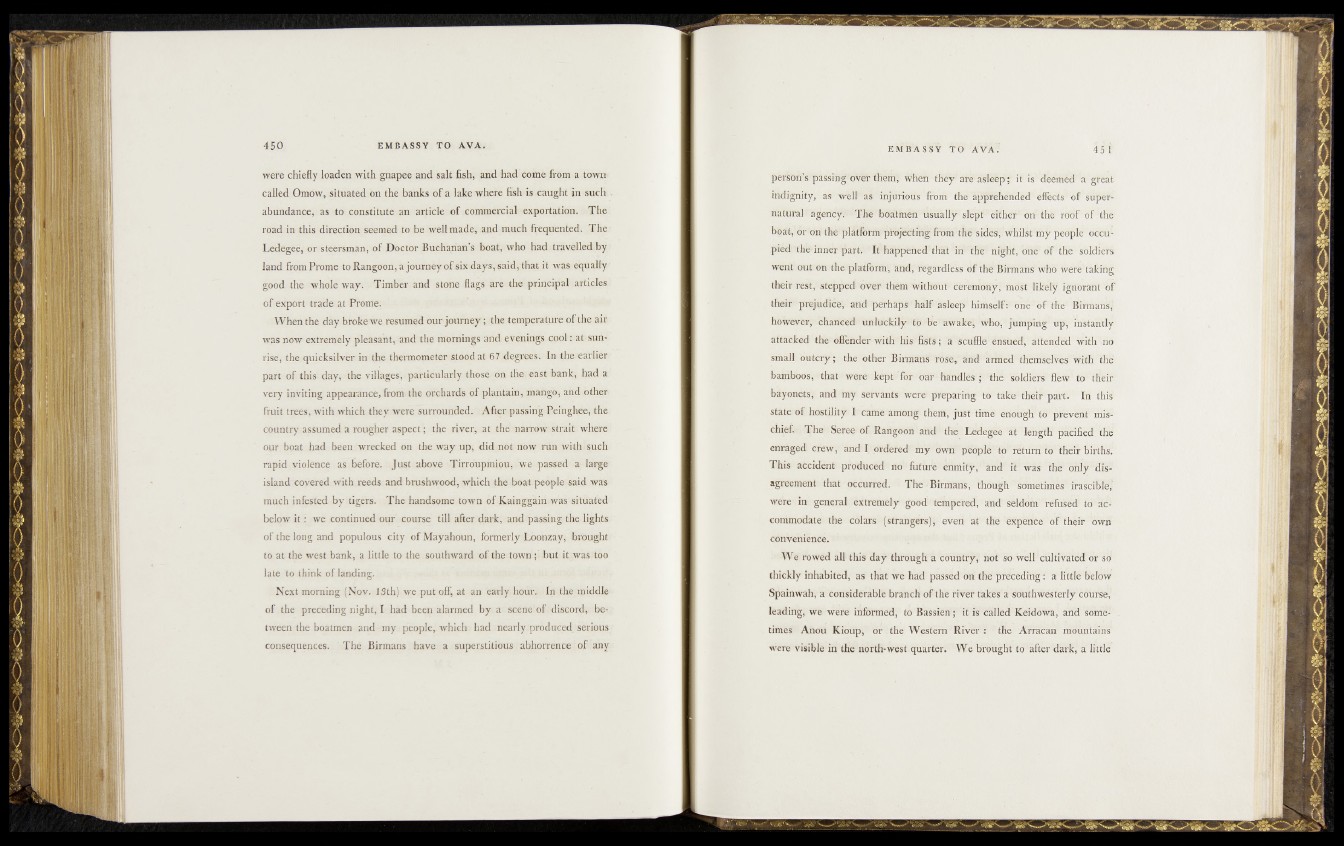
450 E M B A S S Y Ï O A Y A ,
were chiefly*loadën with gnapee and salt fish, and had coihè from, a tow»
called Omow, situated.on thé banks ofa lake where fishds-caught ïn-sucHs
abundance,; as - to' constitute an ai^öeaèf icommerciabrexportation. ■-.The:
road-in this direction seemed .to be well made,. .and much frequented. .The?
Ledegee, or steersman, of Doctor Buchafrata-’s boat,- who had travélled.by?
land from Prome to Rangoon, a journéy of six-days, said, that it was equally
good/the whole way. - Timber and stone .flags are thelpriqcijiaksartifiles-i
of export trade at Prome.
- When the day broke we resumed our journey"; the temperature of the air*
was now-extremely pleasant,-and the mornings and- evenings cpote>artsun-i
ris®, th e -quicksilver, in the thermometer stood at 6-7.deg*eest '<I,n thefeS«rlier-''
part- (of this* day, 'the villages, particularly those -on t f e ® a s ft ban kj had af
very inviting appeatance^fromthe orchards of plantain,.maffgo; andvOthefr
fruit trees, with which they were surrounded. Aftenpassing Peiaghdejthe
country assumed a rougher aspect ; the river, at the>narrow*strait where
opr:boat; had been;! wrecked on the waynup;. did not now run w$lfr&pflfts
rapid violence as before. . Just above Tirroupmiou,. we*pa«sed ay large
island covered with reeds and brushwood, which the-boafcpeópdeJ Said was
much infested by tigers. The handsome town of Kainggèin*W®S*ljiTföated?
below i t : we continued our course till after dark, arriJpassing*#he lights*
of thé long and populous city of Mayahoun, fbiteerlyfjihrhtfzaff l^U^f*
to at the west bank, a little to the southward of the town; : hntdtgwasitoo
late 'to think of landing.
Next morning (Nov. 13 th) we .put olfi at an' early hour. In the middle*
of the preceding night; I had been alarmed by a scene of discoidy. between
the boatmen and—m y . people, which had nearly, produced serious
consequences. Thé Birmans have a superstitious abhorrence of-any
pèfte^^fts'Smf^oVÊi- ffi'ëih)' vfiiCTf diè1^ is' deemeda'great
iddignity,' a's' wcll^S^ngur'KSifs^fforfi' thca^feheflded''efects^öf süp'er-
naluraP agerfcyf&Tfte bddtbieh ’usïfall^ sI^#%méï*oi^¥he' roof"W the
bjl^tyor'tön1 fhe< plitform'-p^j^iftm^-' fi?0Tnite%id®9,d^hilst>tay peophFdëfëiip’
pied1'thJé>ifinör'partiM'ïw^^êleö^fRffil^ir^ti^nighf, óM* dï^ilfèP sbMiëni
went outran -the>pladbrm« s;éf taÉifig'
tbèn ''♦wKRéüP' ffiefy igjKbraSf ’óf"
theifr*' prejudice?,- itiduperh^s^fralf1 ?aslteefy' hiiftselftttrare^PWe* BffifiarÉf
hoVeVer;i‘’éhan'éedï1'ü'filetkilyiftbsïfe,^Wkè*i^Mo,^‘-jïitófiit^Ü^iW¥a?il'd,y
attacked the? dffender!*vt.itfe'fhis'fi3ts; a lfcufflëi,3®iiétf,!''lfteriIdM1 with'^JS
smaR outcj^';;,'ït'hei'ot'her Biriii®ï^'*,fÖ^e,^?^ d JHa'rièed^}iê®ël^es with thé*
banhaoos,«that?' wére't kep t’ I Utr/'Öafp'* ^Ifrfers*1 flew to^tnei'tt
WfQÉtJtsf .aHdüdiÉp sefVants W è r ^ p r ë p a r in g ^ 'tb ^ ^ ^ ^ p a t f ^ T f l fRï§-
statgrdll hostility’ k'i^öÉtï&^ÉSüiSIgi them, just timd êrfóll^lf^t^'pft'v^S^illi^
chief?;) T he>; Se ree of RarigOoS aMHRbëllÉlëgeè "ïi 4 Fêhgff*
enraged* crew, andd’f'drdbfed^my*'chv^j^8pfëi,'foi5returh,tÖilfhéil- ÉïfiSs? ’
This- accident- produced* no | fatiife-'efi’mity, ^an'd* if^wS^ flit? Shly^H'is*
agreement- that occurred. TheBirriiUns,
Wéfe#ififfii!gene»aiï extremely good*'tóünpeVecf, (hdï'^JBStó,,1¥eSÖ^T5f,^K=*
coöimodate the cölars(strangers), ’éved at^tlïë 1è'%)é"flce ^órlhiir :ówri
oénYêiiiéndè. jjj ■
- Wd rbWëd aR fhif day feougfr % cdöttfyf Mjw^ï^eli^cttlMvp^^OTSq
thickly inhabited, as that #e>hk®:;'jÉi^#liÉïI#!p f iè if l^ ïtilfïifWï0ërov-
Spainwah, a* considerable branch of thé rivet takes a southwes terly course,s;
leading, Wfe-wétd informed, fö Bassien; it is called Keidowa,and some-
times Anou Kioup, dr .the Western River ;rtne AVracan mounMlns
were visible in the north-west quarter. We brought to ‘after‘*dark,’ a'liVtle